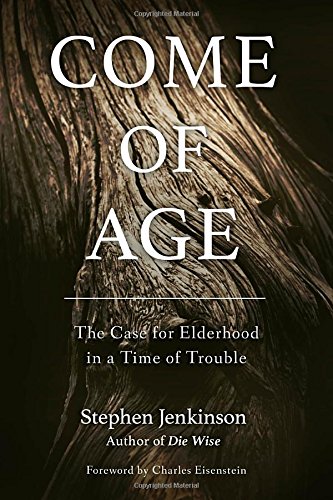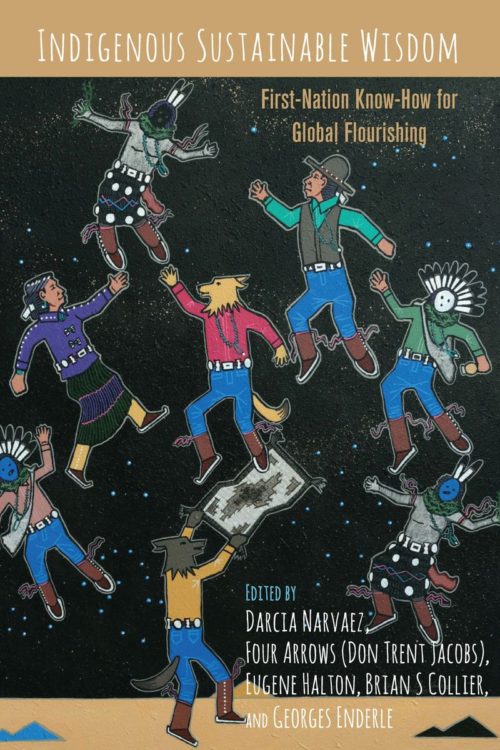What Wise Elders Know
PART FOUR OF FOUR: We need the encouragement that wise elders offer.
“Wise elders have learned from their scars. They have not been taken over by their wounds, nor have they become obsessed with escaping from the pain of imperfection. They have learned to get in touch with their true selves. All major religions, at their sophisticated (called “mystical”) level, emphasize the importance of personal knowledge of one’s true self, one’s existing connection to God or true reality.”
Do you remember as a child climbing up into your grandmother’s or grandfather’s lap and hearing stories that thrilled, but also reassured you? No? Me neither. They were busy farmers.
 But I do remember the kind way my grandparents treated my interest in eating. As soon as we arrived at the farm, my grandfather would take us for maple nut ice cream. And he always kept some chocolate in his pocket for us kids. In preparation for our visits, my grandmother made her famous butterscotch icebox cookies. My grandparents were responsive without harshness.
But I do remember the kind way my grandparents treated my interest in eating. As soon as we arrived at the farm, my grandfather would take us for maple nut ice cream. And he always kept some chocolate in his pocket for us kids. In preparation for our visits, my grandmother made her famous butterscotch icebox cookies. My grandparents were responsive without harshness.
Unlike new parents, who are often missing adequate support, grandparents tend to be more delighted (and forgiving) with children, responding with encouragement instead of control (see here and here for studies). Across societies, parents (aged ~16-40 years) generally are focused primarily on their own work identities, on finding their gifts and honing them or just bringing home the bacon—which is what they should be doing. They are self-conscious about their image and can project this onto their children, being harsh when children don’t live up to their expectations.
Grandparents can be better child-raisers, because they are less invested in their image, tend to be less controlling, and are better able and willing to give in to the spirit-based impulses of the child. They are less likely to worry about “how it looks” and ideally are not distracted with the concerns of the world.
Maslow (1970, 1971) pointed out that only older people can become self-actualized, because younger people are still working on their basic needs (e.g., identity, vocation). Those over 50 are more likely to have shifted away from an egocentric focus to a more integrative way of being (Rohr, 2011), attending to developing connections to others and the natural world, letting go of wanting or needing control, even though our culture does not encourage this.
As pointed out in the last post, Maslow’s description of self-actualized people aligns with the characteristics of wise elders in our ancestral past.
But what did the wise elders of our past know? How did they act?
- They provide an embrace of support to the young, but also a push to not be afraid to self-actualize.
- Elders help the younger grow their unique spirits: “No matter what you do, some people won’t like you, so why not be you? No one else can.”
- Wise elders indirectly guide by modeling living life to the fullest.
- Wise elders know enjoyment and want you to experience it too, whether it’s ice cream, cookies, or a sunset. After all, if you are not experiencing a foundational joy in your life, something is quite wrong (Rohr, 2011).
- Wise elders indirectly guide you in ways of flourishing—with stories.
- Stories help us learn to get back our self when we (inevitably) surrender to others’ preferences instead of those of our inner self. Fairytales are all about finding the true self’s path among competing pressures.
- Wise elders know that words matter. It is easy to discourage the spiritual development of others with words. Stories provide an invitation instead of persuasion or coercion.
- Wise elders encourage the young to not surrender their life force.
- They know everyone’s path is unique and everyone has a gift to uncover, develop, and share with the community.
- In our ancestral conditions, such as among First Nation/American Indian/Native American groups, wise elders show us how to respect the rest of nature.
- They know the local landscape and how to live sustainably in that landscape
It’s not that wise elders are naïve livers of life. They are scarred. To become self-actualized, one must accept suffering and learn from it (instead of medicating it and running from its lessons). Suffering occurs when you let go of your certainty, your ego persona(s), your defenses against feeling open and vulnerable. Among the ancient philosophers, suffering was assumed to be necessary in attaining virtue and wisdom.
A wise elder exemplar of our time, Jean Vanier, founded L’Arche communities. He died earlier this year. Michael Spezio has investigated moral virtue within L’Arche community members and had a chance to interview Jean Vanier here.

Wise elders have learned from their scars. They have not been taken over by their wounds, nor have they become obsessed with escaping from the pain of imperfection. They have learned to get in touch with their true selves. All major religions, at their sophisticated (called “mystical”) level, emphasize the importance of personal knowledge of one’s true self, one’s existing connection to God or true reality.
Young children and wise elders seem to more easily slip into this broader reality, which gives one a sense of deep connection with the universe (Maslow’s “peak experience”). They are able to shift away from the materialistic, goal-oriented, calculative existence that our societies emphasize.
That’s probably why so often grandparents and their grandchildren get along so well. They know that one of the deepest forms of joy is being present with one another, playing.
SERIES
1. Older and Weaker, or Older and Wiser? How Will You Grow Old?
2. Wise Elders in the Circle of Life
3. Self-Actualize and Become a Wise Elder
4. What Wise Elders Know ABOVE
REFERENCES
Hrdy, S. (2009). Mothers and others: The evolutionary origins of mutual understanding. Cambridge, MA: Belknap Press.
Maslow, A. H. (1970). Motivation and personality, 2nd ed. New York: Harper & Row.
Maslow, A. H. (1971). The farther reaches of human nature. New York: Viking.
Rohr, R. (2011). Falling upward: A spirituality for the two halves of life. San Francisco, CA: Jossey-Bass.
Photo Shutterstock/Tekkol’s

